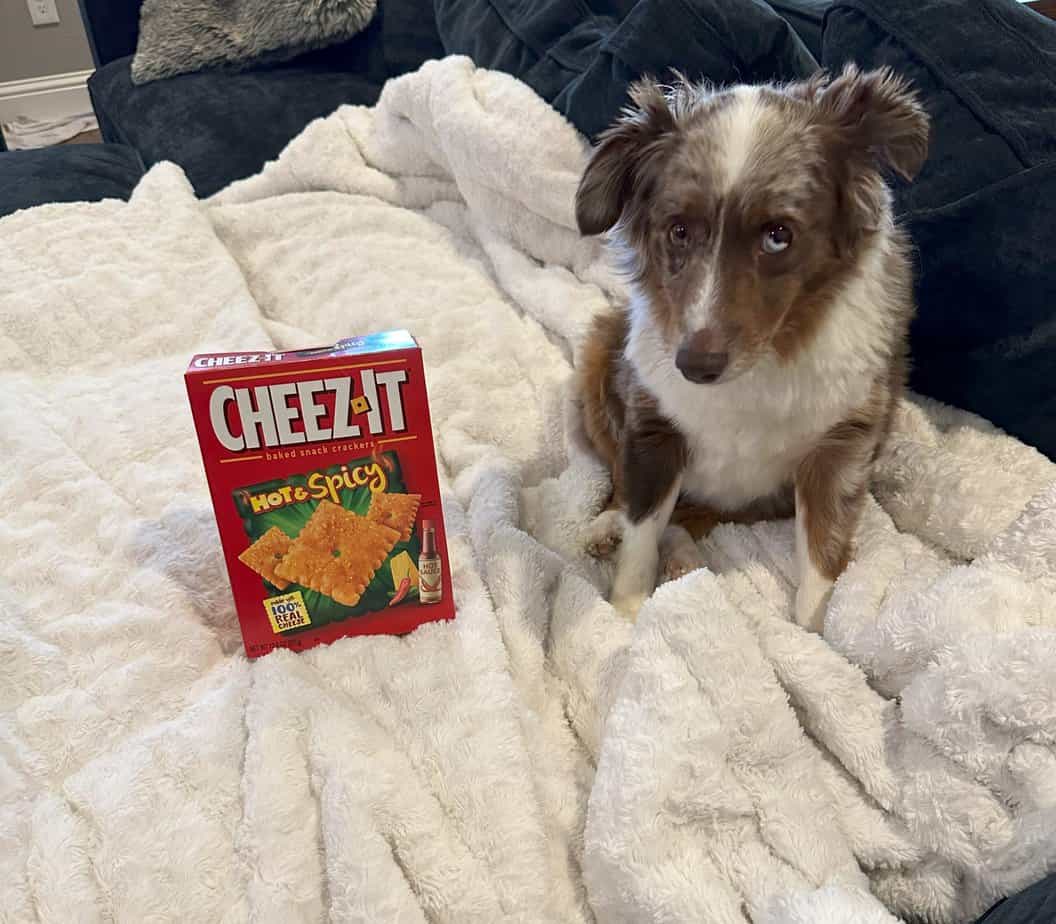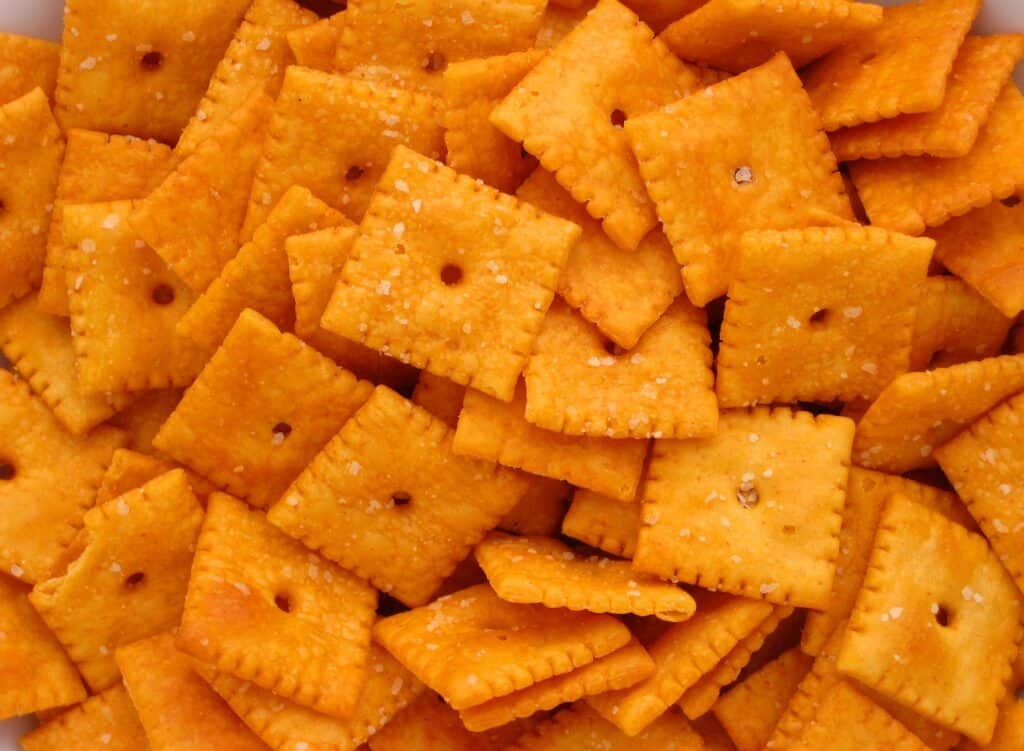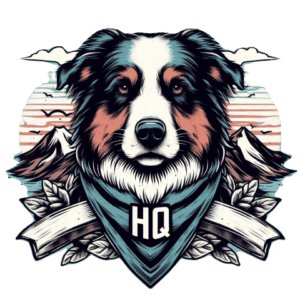
Can Dogs Eat Cheez Its? This in-depth article explores if it’s safe for dogs to eat Cheez Its, potential health risks, serving tips, and healthier snack alternatives to these cheesy crackers. Cheez Its are one of America’s favorite cheesy cracker snacks. These baked crunchy squares have a tasty, addicting flavor that humans love. But if you’re an Australian Shepherd owner, you may have wondered, can dogs eat Cheez Its too? Or are these processed crackers bad news for your four-legged friend?
This is an important question for any pet parent. As Aussie lovers, we want to share special treats with our pups. However, people food doesn’t always translate well to dog food. Many human foods can cause harm if eaten by canines.
We’ll discuss the potential benefits and risks of giving Cheez Its to your Aussie. You’ll learn about the ingredients in Cheez Its, and how they may impact your canine’s health and nutrition. We’ll also provide tips on the best ways to serve Cheez Its to dogs. Or if you decide your pup should avoid cheese crackers altogether, we’ll suggest some healthier snack alternatives.
Are Cheez Its Safe for Dogs to Eat?

When considering any human food for your dog, the first question should be – is it safe? Let’s break down the ingredients in Cheez Its to find out.
Cheez Its contain enriched flour, sunflower and/or canola oil, cheddar cheese (milk, cheese cultures, salt, enzymes), salt, leavening (baking soda, sodium aluminum phosphate), yeast, spices, artificial colors (including Yellow 6), and natural flavors.
The main components – flour, oil, and cheese – are not toxic to dogs. In fact, small amounts of cheese can be a healthy treat for dogs, providing protein, calcium, and vitamins A and B12. Just be sure your dog is not lactose intolerant.
However, there are some concerns with Cheez Its for canine consumption:
Fat Content – Cheez Its are high in fat, with around 8 grams per serving. Too much fat can cause pancreatitis, diarrhea, and vomiting in dogs. Obese dogs should not eat high-fat snacks like Cheez Its.
Salt Content – Cheez Its also contain high amounts of sodium, with around 380 mg per serving. Excessive salt can cause sodium ion poisoning in dogs, leading to vomiting, diarrhea, depression, tremors, elevated body temperature, and seizures.
Choking Hazard – The crunchy crackers could present a choking risk for dogs, especially if they are eaten too quickly. This is especially dangerous for small dog breeds.
Artificial Additives – The artificial colors and flavors in Cheez Its offer no health benefits and may cause adverse effects in some dogs.
So while not immediately toxic, Cheez Its do come with some health concerns related to their fat, salt, and additive content. Moderation and portion control are key for dogs eating this people snack.
Potential Health Risks of Feeding Cheez Its to Dogs
While Cheez Its themselves are not directly toxic to dogs, feeding your canine companion too many of these processed snacks could lead to some adverse health effects. Here are some potential risks and issues to be aware of:
Obesity – Cheez Its are high in fat and calories. Giving too many to your dog can quickly lead to weight gain, which can contribute to obesity along with other health problems like joint issues and diabetes. Obese dogs should not be allowed to indulge in Cheez Its.
Pancreatitis – The high fat content in Cheez Its may cause inflammation of the pancreas known as pancreatitis in some dogs. This is an extremely painful condition that requires veterinary treatment. Dogs prone to pancreatitis should not eat high-fat human foods like Cheez Its.
Sodium Toxicity – As mentioned previously, Cheez Its contain a lot of sodium. Eating too many crackers can cause sodium ion poisoning, resulting in vomiting, diarrhea, lethargy, and even seizures in severe cases.
Digestive Upset – Too many Cheez Its may wreak havoc on your dog’s stomach and cause vomiting, diarrhea, gassiness, or constipation. The high fat, salt and spice content are common culprits.
Kidney Problems – Excessive sodium intake over time can put strain on dogs’ kidneys. Dogs with existing kidney disease should not consume salty snacks like Cheez Its on a regular basis.
The bottom line is moderation and common sense are key. The occasional Cheez It as a treat is fine for most healthy dogs. But they should not make up a substantial part of a dog’s diet or be fed in excess due to the health risks. Dog owners need to be aware of the signs of a cheese cracker overload.
Safe Ways to Give Dogs Cheez Its
At this point, you may be thinking it’s best to avoid giving your dog Cheez Its altogether. However, with proper precautions, you can safely allow your furry friend an occasional cheese cracker as a treat in dog-friendly moderation. Here are some tips:
- Break crackers into small pieces. Breaking Cheez Its into bite-sized bits can greatly reduce the choking hazard for your dog.
- Limit quantity. No more than 1-2 crackers a day for small dogs, 2-3 for larger breeds. Cheez Its should compose no more than 10% of your dog’s daily caloric intake.
- Monitor for signs of a negative reaction. Keep an eye out for vomiting, diarrhea, or other distress after feeding Cheez Its and discontinue use if these occur.
- Avoid giving to obese or sodium-sensitive dogs. Stick to low-sodium, low-fat treats if your dog has weight or kidney issues.
- Only feed as an occasional treat. Cheez Its should be an infrequent snack, not a dietary staple. Too much, too often heightens health risks.
- Always supervise your dog when eating. Make sure they ingest crackers completely rather than hastily gulping chunks. Retrieve any fallen crumbs.
Following these tips will allow your dog to partake in this beloved human snack safely and in moderation. The key is control and close monitoring to avoid adverse health effects. Used sparingly as a treat, Cheez Its can be dog-approved.
Healthier Snack Alternatives for Dogs
While the occasional Cheez It can be permissible, there are many healthier snack options for dogs if you want to avoid processed human foods. Here are some crunchy, low-calorie alternatives:
- Carrots: A great source of vitamins and fiber. Offer raw, cooked, or freeze-dried.
- Green beans: Provides vitamins K, C, and A. Blanch or steam for easier digestion.
- Apple slices: Contains vitamin C and antioxidants. Remove seeds and core first.
- Peanut butter: Look for brands with no added salt or sugar. Freeze into lickable treats.
- Pumpkin or sweet potato: Rich in fiber, beta carotene, potassium. Bake as doggie “fries”.
- Plain popcorn: Whole popped kernels are a low-calorie crunch dogs love. Skip the butter and salt.
- Dog biscuits or kibble: Vet-approved options made to be safe and nutritious for canines.
For dogs that can tolerate dairy, a small piece of low-fat cheese can provide protein without the carbs and sodium of Cheez Its.
Ultimately, the healthiest snacks for dogs come from simple whole foods. Natural treats avoid excess fat, salt, and preservatives while providing more nutritional value. Moderation is still key, even with healthy snacks. But switching out Cheez Its for lower-calorie produce and snack options better supports your dog’s overall wellbeing.
Conclusion
Can Dogs Eat Cheez Its? In small amounts, yes, this popular human snack can be an occasional treat for your canine companion. Cheez Its themselves are not toxic to dogs. However, there are some health risks to be aware of. These crackers are high in fat, salt, and calories which can lead to obesity, pancreatitis, and sodium poisoning in dogs if consumed in excess.
The biggest safety concern is the choking hazard from improperly chewed crackers. To enjoy Cheez Its safely, they should be broken into bite-sized pieces and limited to 1-2 per day for small dogs and 2-3 for larger breeds. Cheez Its should only comprise a maximum of 10% of your dog’s total daily calories.
It’s also essential to monitor your dog closely when feeding Cheez Its and stop providing them if you notice any vomiting, diarrhea, or other negative reaction. Obese dogs or those with kidney issues should avoid the high sodium and fat content of Cheez Its. While the occasional cheese cracker in moderation is not harmful for most canines, healthier snacks like carrots, apple slices, and plain popcorn are lower in calories and safer alternatives. Used sparingly as a treat, Cheez Its can be permissible for dogs. But moderation and vigilance are key to avoiding adverse health effects in our furry, cheese-loving friends.
Recent Posts
White Australian Shepherd Health: Understanding and Managing Genetic Conditions
When it comes to the White Australian Shepherd, their striking appearance often captures the hearts of dog lovers. However, beneath their beautiful white coats lies a critical topic every owner or...
Australian Shepherd Lifespan Australian Shepherd Lifespan is 12-15 years. Learn tips on nutrition, exercise, and health care to maximize your Aussie's longevity. With their signature merle...
